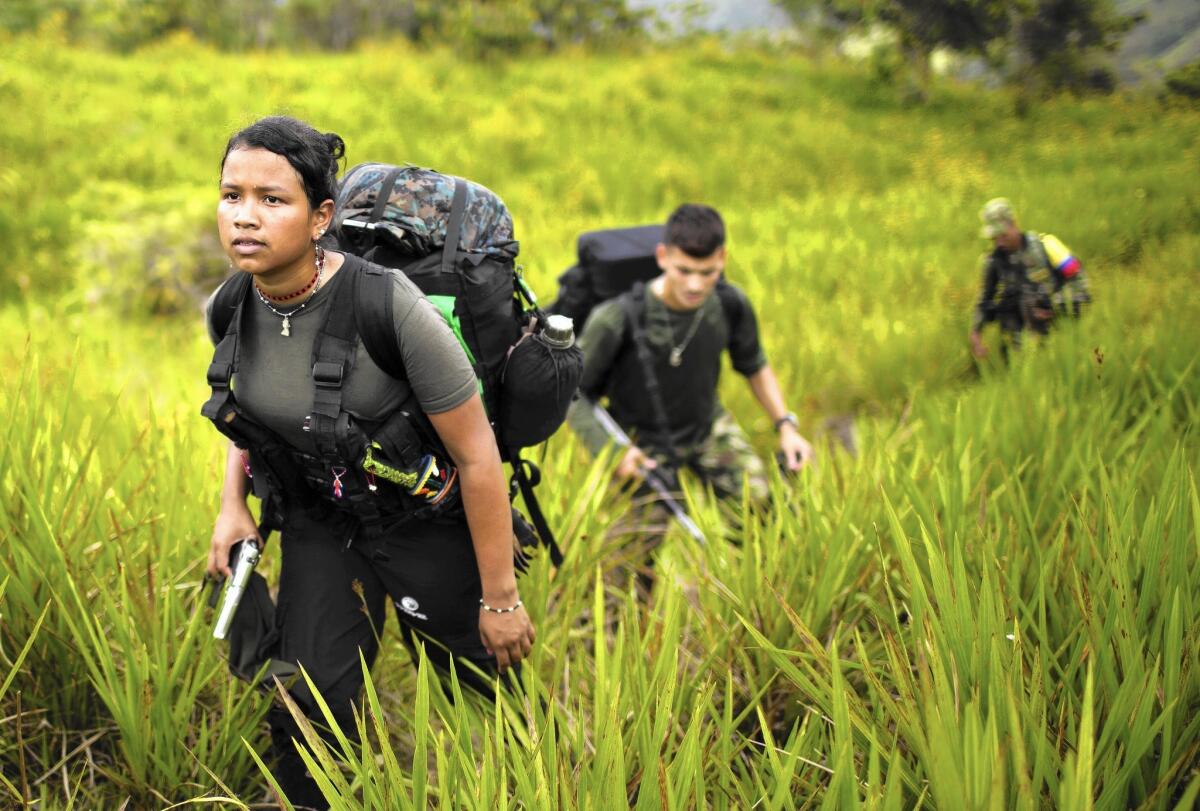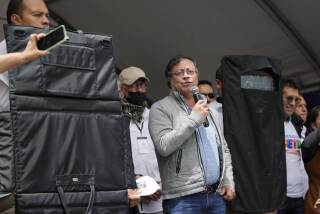U.N. Security Council votes to send hundreds of peace monitors to Colombia if deal is signed

- Share via
reporting from BOGOTA, Colombia — Colombia’s goal of ending 50 years of civil conflict moved closer to reality on Monday when the United Nations Security Council voted to send hundreds of monitors to oversee a cease-fire and the disarming of leftist rebels if a peace accord is signed.
By a 15-0 vote, the Security Council approved the petition by the Colombian government and the Revolutionary Armed Forces of Colombia, or FARC. The two sides have been negotiating in Havana since November 2012.
Observers said the joint request for monitors meant a final peace agreement may be imminent. President Juan Manuel Santos and FARC leader Timoleon Jimenez previously set a March 23 deadline for a deal.
Calling the U.N. decision a “monumental step forward,” Bruce Bagley, a University of Miami international relations professor, said the Security Council has “bought into the notion that this is the end of hostilities and the end of the long-running guerrilla war.”
He cautioned though that a peace accord would still leave the country with significant challenges, including organized crime, drug-related violence and paramilitary groups.
Michael Shifter, president of the Inter-American Dialogue think tank in Washington, noted that peace will ultimately depend on domestic politics in Colombia.
Recent polls show a majority of Colombians are skeptical about terms of a peace deal, which would include amnesty and post-conflict political roles for the rebels. A final peace accord would have to be put before Colombian voters for approval.
“The outcome of a popular referendum is uncertain and implementation of the accords could also be quite difficult,” Shifter said. “Santos has won over the international community, but whether he can win over most Colombians is another question. “
The FARC rebels and the Colombian government have been at war since 1964 in the hemisphere’s longest-running conflict. Peace negotiations between 1999 to 2002 ended in failure. A unilateral cease-fire by the FARC last summer has remained in effect.
Britain played a key role in drafting the plan to send the monitors, which would come from several Latin American nations as well as Colombia. The number of monitors to be sent to Colombia was unclear Monday.
“Verifying a cease-fire and disarmament will be a very demanding job and require professionals with high credibility and past experience,” said Adam Isacson, a senior researcher at the Washington Office on Latin America. “The U.N. can provide both.”
Training of monitors will take several months, so the Colombian government was eager to start the process with the Security Council vote even though a final pact hasn’t been signed.
In her address Monday to the Security Council, Colombian Foreign Minister Maria Angela Holguin said the monitors would arrive in Colombia soon after the signing of a peace accord and stay for a year.
“The will of the council to work with Colombia on this matter is of fundamental importance to the success of the process,” Holguin said.
The government and the rebels are still negotiating several issues, including how disarmament will be carried out.
El Tiempo newspaper reported Sunday that the rebel group wants to demobilize its 17,000 fighters and urban militia members in 63 different points across the nation. The government has proposed 30 sites.
Another unresolved issue is how to fund the peace process, which the International Monetary Fund has estimated will cost billions over a 10-year period. Isacson and other political analysts have said they expect Santos to ask the U.S. Congress for $1.5 billion in aid over the accord’s first three years.
Such support would be considered an extension of Plan Colombia, the U.S. aid program that has given Colombia more than $10 billion in military, intelligence and social development support since 2000 to fight the drug trade and terrorism.
Kraul is a special correspondent.
More to Read
Sign up for Essential California
The most important California stories and recommendations in your inbox every morning.
You may occasionally receive promotional content from the Los Angeles Times.










